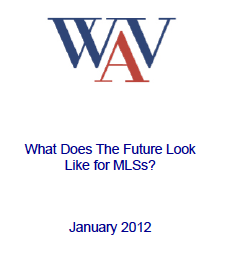 In this white paper, we explore what the future may look like for MLSs and steps they can take to make sure they position themselves ideally for their market. It’s not a one-size fits all answer. To download the complete report, click here!
In this white paper, we explore what the future may look like for MLSs and steps they can take to make sure they position themselves ideally for their market. It’s not a one-size fits all answer. To download the complete report, click here!
MLSs have come a long way over the years and we have seen what were once small, localized operations formed by associations and brokers morph into more and more large regional organizations. We have seen technology expand at exponential rates with the Internet and with that technology we have seen changes in the real estate market at all levels. Consumers now play a major role in the real estate transaction long before engaging an agent and this dynamic has created a new consumer industry. MLSs have moved from a simple technology platform designed to share listing data and manage co-broker sales to large menus of technology tools and services.
Yet, in spite of these additional tools, there are some that feel MLSs are not always acting in the best interest of members and that some have forgotten whom they work for. Some brokers see them as competitors trying to level the playing field. Some feel they go too far into what they offer and the control they try to exert over their member’s real estate businesses.
Issues of consolidation and control are also prevalent at every level of our industry as interests from a national to a local level try to solidify their relevance and long-term survival. We have seen numerous instances where major initiatives take place as if in a vacuum with special interests pushing their view of how the industry should work on the rest of us. When this occurs we see walls go up, a sense of mistrust develop and a lack of overall cooperation that in turn hurts everyone.
At the core of our industry, the MLS is still strong, and the majority of our MLSs do an outstanding job of listening to their members and providing great service and products at an incredibly low price. But there are questions where MLS services end and broker services begin. There are questions of what the ultimate role of the MLS should be.
This paper looks at the pressures impacting MLSs today and offers suggestions on how to find the right balance for each MLS with their broker members. It also calls for our MLSs to be “the leader and voice” of the industry.
To download the complete report, click here!





Updated MLS systems with training incentives will make the difference in future agent credibility. Emerging clientele under age forty and retirees relocating to Nevada want agent expertise.
Great observations Paul. It is interesting that you bring up training incentives – it is a rather new concept for our industry. Your idea has got me thinking creatively. Perhaps an MLS should offer member benefits based upon training certificates.
For example, if you want to use product X as a free member benefit – attend a training each year (online or in person) – otherwise, you pay.I know that many MLSs like to “force” new user orientation – but I have not observed of any “incentive” based training programs. The non-tangible incentive has always been that an agent who is expert at using professional tools will provide clients with better service and will likely sell more real estate.